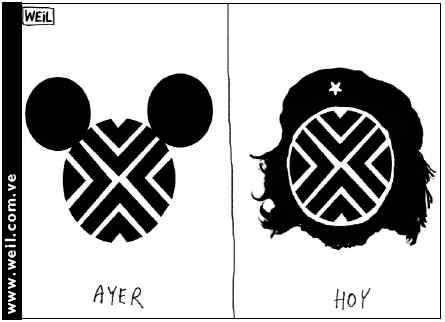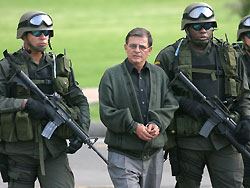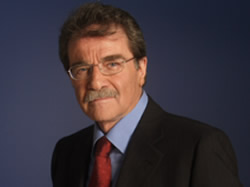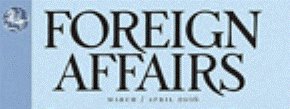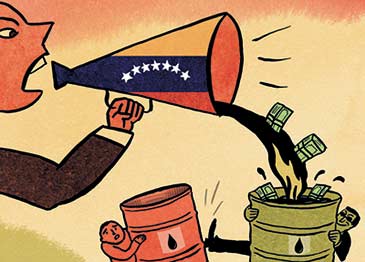El Universal
Caracas, miércoles 26 de abril, 2006
Economía
APERTURA PETROLERA / En siete años Chávez ejecutó la estrategia, según Burelli "Gobierno participa de la ilegalidad"
Para el ex directivo, la política es el motivo real que esconden las estrategias de Petróleos de Venezuela y es lo que justifica las enormes diferencias entre el discurso y la práctica
MARIANNA PARRAGA
Pedro Mario Burelli, quien fuera director externo de Petróleos de Venezuela en los tiempos en que se orquestó la apertura, no tiene empacho en decir que la política energética de este gobierno ha estado plagada de "grandes equivocaciones". La estrategia de Ciavaldini, los errores de las contrataciones colectivas y el despido masivo de trabajadores tras el paro son apenas tres de los aspectos que enumera de una extensa lista.
De la misma manera, sin embargo, quienes regentan la industria petrolera condenan no sólo las políticas de la ahora llamada "vieja Pdvsa", sino además las destrezas gerenciales de sus conductores.
Las actuales autoridades petroleras del país sostienen que la apertura fue un fracaso al revertir los logros de la nacionalización y entregar a las transnacionales la operación de campos que no eran marginales.
Toda estrategia que se aborta es difícil de evaluar. Este gobierno, que lleva siete años, ha tenido el período más largo de desarrollo de esos proyectos que, además, hay que poner en contexto histórico. Sería difícil imaginar cuál sería la producción petrolera actual sin los privados. Inicialmente abarcaría 20% del total y hoy supera 40%.
Pero se afirma que se irrespetó el espíritu del artículo quinto de la Ley de Nacionalización
Esa opinión es de por sí arbitraria, porque hubo mucho más debate entonces que ahora sobre el tema y la interpretación de distintas personas sobre ese artículo fue favorable, la Ley no era taxativa. Yo también diría que muchas de las cosas que se ven ahora, y que no son debatidas, son ilegales. En todo caso, este gobierno ha sido partícipe de la ilegalidad, pues fue quien efectivamente ejecutó la apertura.
Alega que le tomó tiempo conocer el problema y corregirlo.
El tiempo es una excusa bastante pírrica. Alí (Rodríguez) se opuso sólo a algunos aspectos de la apertura.
Las expectativas difundidas en 1996 indican que los convenios no cumplieron las metas volumétricas. ¿Qué beneficios se derivaron de esos negocios?
Quien no cumplió con su parte fue Pdvsa, pues ahora se estarían produciendo más de 5 millones de barriles diarios. Hoy Pdvsa tiene la mitad del esfuerzo propio de 1999, cuando por sí sola generaba 3,4 millones de barriles diarios, y los privados pasaron de 400 mil b/d a 1,1 millones. El caso de los negocios de la Faja es particularmente importante, y reto a cualquier gerente a montar un proyecto distinto en esas condiciones, pues lograron grado de inversión como calificación crediticia y el gobierno de Chávez los inauguró sin ninguna crítica. La tasa pudo haberse elevado después.
¿Por qué los convenios no tuvieron el aval del Congreso?
En la definición de contrato de servicio se consideró que no requerían aprobación del Parlamento y ese fue el consenso político. La tercera ronda fue el proceso de licitación más transparente que se ha hecho en Venezuela. Si hubiera habido dudas jurídicas, no lo hubieran logrado. La interpretación de ilegalidad la hace un sólo bando de un gobierno autoritario. Yo me quedo con la interpretación que se hizo en un ambiente de democracia (...) Ahora Pdvsa va a ser contratista de sí misma en un archipiélago de empresas mixtas. Eso no aguanta un análisis, es un modelo absurdo.
El Menpet considera que es el modelo más estable.
Si Pdvsa las maneja como opera la producción propia, bajo criterios eminentemente políticos, no veo durabilidad.
¿Qué opina de la reorientación de la internacionalización?
La política anterior nunca excluyó a América Latina porque la idea era ser el principal suplidor petrolero del Hemisferio. Se evaluaron oportunidades usando el criterio comercial que era el que, creíamos, era nuestra obligación. En el caso de EEUU, ha habido un ataque permanente a esos activos para impulsar una estrategia política.
¿Cuál será el destino de la relación energética de EEUU y Venezuela?
Es lamentable la contradicción. Pdvsa va a EEUU y ofrece ampliar sus metas volumétricas en función de ese mercado, pero la línea política de Chávez es todo lo contrario. De tanto hablar, lo que ha logrado es que las autoridades de ese país tomen como caso base el corte de suministro venezolano para tomar medidas (...) No lo descarto.
¿A quién perjudicaría?
Al venezolano de calle que rechaza el conflicto. Somos nosotros quienes no estamos en la ecuación de Chávez.
¿Cuál era el siguiente paso de la apertura? Pdvsa coqueteó con la idea de cotizar en bolsa.
Aunque se ha satanizado la privatización, nunca hubo una intención más allá de colocar un máximo de 10% de las acciones de Pdvsa en la bolsa. Eso hubiera hecho más difícil la destrucción sistemática de Pdvsa, porque el universo de dolientes hubiera sido más amplio, y hubiera vuelto a la empresa más transparente (...) El plan actual de crecimiento de Pdvsa no tiene un esquema racional de financiamiento. O el Estado deja de usar la empresa para financiar la inversión social o se financia en condiciones desventajosas.
¿Cómo compara el valor de la antigua Pdvsa con el actual?
Comparar valor cuando hay un efecto de precios que no refleja la calidad de la gestión no sería transparente, pero el riesgo actual de Pdvsa es muchísimo más alto. Entonces Pdvsa valía de 100 mil a 150 mil millones de dólares, pero ahora se desconoce, es lo que se pierde cuando una empresa se maneja dando tumbos.
La empresa redireccionó su política social. ¿Cree que Pdvsa se había alejado del venezolano?
El populismo es muy barato. La intención real de Pdvsa es manejar recursos para que el Gobierno los administre directamente. Buscando evadir controles, el Presidente le mete mano a Pdvsa y desvirtúa su función. Si antes Pdvsa era un Estado dentro del Estado, hoy es el Estado. A uno le cuesta entender que esta política petrolera sea nacionalista, porque no redunda en desarrollo real. Quisiera saber quién es el verdadero amo de esta política montada por (Bernard) Mommer, de seguro no somos los venezolanos.
¿Qué rol hubieran jugado en un proceso de cambio los 19.500 despedidos tras el paro?
He dicho que aunque se defendieron los derechos de los trabajadores, el paro sembró la semilla de la destrucción de Pdvsa. El Presidente ha admitido que tentó el paro y no se hubiera convertido en un drama si no se hubiera despedido a esa masa de trabajadores. El manejo político del petróleo es demasiado tentador para no hacerlo.
mparraga@eluniversal.com
Read more of this PMBComment!
